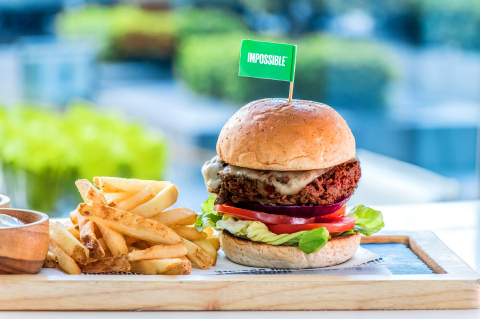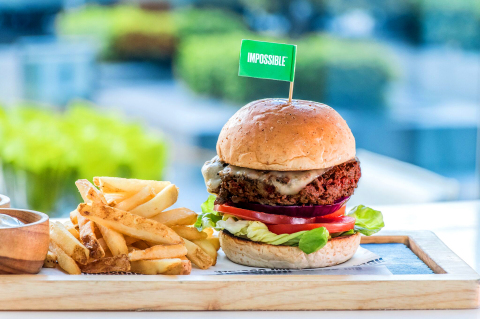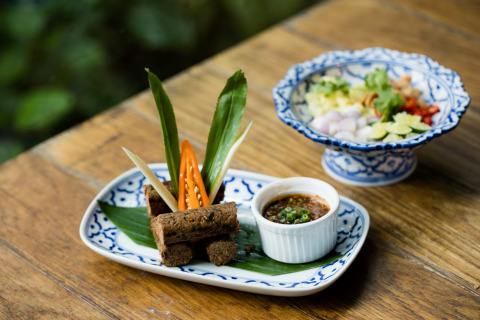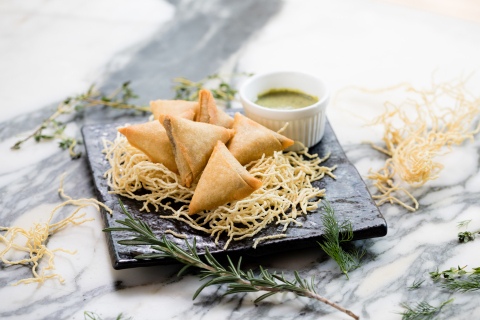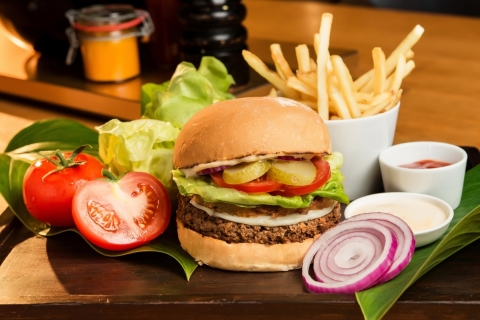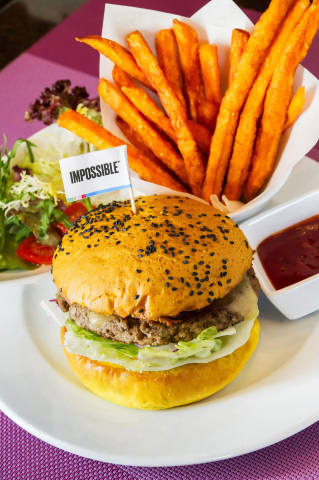HONG KONG--(BUSINESS WIRE)--Impossible Foods is offering its award-winning, plant-based meat at three of Hong Kong’s top-ranking hotels: Hotel ICON, Grand Hyatt Hong Kong, and InterContinental Grand Stanford Hong Kong.
Impossible Foods made its debut in Hong Kong last month at Chef May Chow’s celebrated restaurants Little Bao and Happy Paradise and Chef Uwe Opocensky’s popular Beef & Liberty. Hong Kong is the first place outside of the United States to feature the Impossible, which cooks, smells, and tastes like ground beef from cows, but is made entirely from plants.
The Impossible is served in nearly 2,000 restaurants across the United States and Hong Kong -- from award-winning restaurants to mom-and-pop diners to America’s original fast-food chain, White Castle. The vast majority of these restaurants serve the Impossible as a burger on a bun with traditional condiments and sides, but Impossible meat also can be adapted into a wide range of dishes, such as dumplings, noodle bowls, tacos, meatballs, breakfast sandwiches, and more.
“We’ve been so pleased with the warm welcome and support of Impossible in Hong Kong,” said Dr. Patrick O. Brown, CEO and Founder of Impossible Foods. “As our first market outside of the U.S., it’s been an illuminating experience to see such positive feedback from diners and we’re really looking forward to launching next in some of the city’s best hotels and restaurants.”
FIVE-STAR HOTEL DINING GOES IMPOSSIBLE
The Impossible will debut today at Hotel ICON in Tsim Sha Tsui, the renowned hotel known for its design-forward elegance and sweeping views of Victoria Harbour. The plant-based meat will be featured at Hotel ICON’s all-day café and brasserie, GREEN, and the open air marketplace-inspired eatery, The Market, which has taken the award for Open Rice’s Best Buffet in Hong Kong for the seventh year in a row.
At GREEN, guests can enjoy the Impossible Burger, served on a vegan bun, topped with gouda, onions and pickles (HK$140 + 10% serv). At The Market, the Impossible will be offered in a variety of dishes inspired by the best of Hong Kong and South East Asian cuisine, including: Impossible Meatballs with tomato herb sauce, Thai Spicy Country Sausages, Tandoori Kebabs with cucumber raita, Braised Eggplant with Impossible Mince and chilli sauce, Braised Bean Curd with Impossible Meat Sauce, Mini Impossible Cheeseburgers, Crispy Impossible Samosas with mint chutney, Indian Impossible Meatball Curry with condiments and papadom, and Crispy Fried Wontons with sweet and sour sauce.
In addition, The Market will showcase Impossible’s versatile nature through its breakfast menu, including: the Impossible Hash Brown, Steamed Egg with Impossible Mince and Tomato Sauce, Impossible Herb Sausage, and Impossible Meat and Bread Pudding with Tomato Sauce.
Across the harbour, Impossible will also be added to the menu at Wan Chai’s luxury 5-star hotel, the Grand Hyatt Hong Kong. Available at two of the hotel’s signature restaurants, the Grand Cafe and The Grill, the Impossible Burger will be topped with veganaise, Daiya provolone, a sweet potato rustique, and herbs (HK$230 + 10% serv).
Taking buffet and all-day dining to another, more engaging level, Café on M – inside the InterContinental Grand Stanford Hong Kong – offers experiences designed to satisfy all five senses. Appearing on the restaurant’s à la carte menu, the Impossible Indian Burger at Café on M will be prepared on a turmeric bun topped with cheese, onion bhaji, cucumber yoghurt, and spicy pickles served alongside sweet potato fries (HK$168).
BIG TASTE, SMALL FOOTPRINT
In development since 2011, the Impossible Burger debuted in July 2016 at Chef David Chang’s Momofuku Nishi in Manhattan. The Impossible Burger is the only plant-based burger to win a 2017 Tasty Award and a 2018 Fabi Award from the National Restaurant Association.
In addition to the American fast-food chain White Castle, The Impossible Burger is the only plant-based burger featured in America’s most beloved “better burger” concepts Fatburger, Umami Burger, Hopdoddy, The Counter, Gott’s and B Spot, the Midwest burger restaurant owned by Chef Michael Symon.
Impossible meat is made from simple ingredients, including water, wheat protein, potato protein and coconut oil. One special ingredient — heme — contributes to the characteristic taste of meat and is the essential catalyst for all the other flavors when meat is cooked. Heme is an essential molecular building block of life, one of nature’s most ubiquitous molecules. Although it’s found in all living things and in virtually all the food we eat, it’s especially abundant in animal tissues. Impossible scientists discovered that it’s the abundance of heme in animal tissues that makes meat taste like meat.
To satisfy the global demand for meat at a fraction of the environmental impact, Impossible Foods developed a far more sustainable, scalable and affordable way to make heme and therefore meat, without the catastrophic environmental impact of livestock. The company engineers and ferments yeast to produce a heme protein naturally found in plants, called soy leghemoglobin. The heme in Impossible meat is identical to the essential heme humans have been consuming for hundreds of thousands of years in meat — and while it delivers all the craveable depth of beef, it uses far fewer resources.
Impossible meat is produced without slaughterhouses, hormones, antibiotics, cholesterol or artificial flavors. It uses about 75% less water, generates about 87% fewer greenhouse gases, and requires around 95% less land than conventional ground beef from cows.
ABOUT IMPOSSIBLE FOODS
Based in California, USA, Impossible Foods makes delicious, nutritious meat and dairy products directly from plants -- with a much smaller environmental footprint than foods from animals. The privately held company was founded in 2011 by Patrick O. Brown, M.D., Ph.D., formerly a biochemistry professor and Howard Hughes Medical Institute investigator at Stanford University. Investors include Horizons Ventures, Khosla Ventures, Bill Gates, Google Ventures, UBS, Viking Global Investors, Temasek, Sailing Capital and Open Philanthropy Project.
More information:
impossiblefoods.com
www.twitter.com/impossiblefoods
www.facebook.com/impossiblefoods
www.instagram.com/impossible_foods
Press kit:

